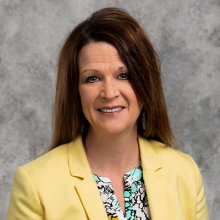South Dakota has several grants related to hospice and palliative care that are underway in various stages.
Brandi Pravecek, DNP, CNP is a very busy healthcare professional. In addition to her full-time position as Clinical Assistant Professor at SDSU’s nursing program, she also practices as a certified nurse practitioner in her home community of Scotland in the clinic and at the critical access hospital-LJMH.
Having worked for more than 20 years as a nurse practitioner in rural communities, Brandi has had the opportunity to see firsthand members of her community who were limited in their understanding of the serious illnesses they were facing and the lack of discussion about the benefits/burdens of all the different options they had for care. With only one physician who had to split her time between the clinic, hospital, and nursing home one day a week, it was no wonder there wasn’t time to have goals of care conversations with community members and their families. These conversations are lengthy to really explore ones understanding of the serious illness and the person’s values, hope, fears, and goals.
As part of her DNP program in 2018, she focused on her passion of palliative care. Her project was building a referral palliative care service for the residents in Scotland. The other providers in the community would refer to her to have goals of care conversations with patients and their families either at the clinic, the hospital, or the nursing home. She also obtained an Advance Practice RN Certificate in Palliative Care through the California State University Institute for Palliative Care making her not only a palliative care specialist, but more importantly, a champion for primary care palliative care in the rural areas.
As this referral program became more successful, she became aware of another factor that may contribute to when and if a provider had a conversation with their patient about his/her serious illness before a crisis. That factor is the familiarity that a rural community provider has with his/her patients. “Some of the people I was having conversations with I had known my whole life and it was hard, even though I know how to have these conversations.” A hypothesis began to form based on her own experience and the experience of others in the community- Does one’s personal familiarity with patients impact a provider’s ability and willingness to have or the timing of when to have a goals of care conversation with a patient who has a serious illness. Is there a difference between rural and urban providers?
Thanks to an Innovation and Research, Scholarship, and Creative Activity (RSCA) Challenge Grant through SDSU, Brandi as lead investigator and Mary Isaacson, PhD, CHPN, co-investigator are now conducting a study of just that hypothesis. They plan to administer a survey to licensed, interdisciplinary healthcare professionals to get quantitative data and then if consent is given, to interview these healthcare professionals to get qualitative information. They hope to have this completed before the end of December this year. They plan to complete data analysis over the winter and disseminate the findings by spring.




